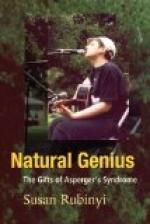My ancestors were gentlemen of considerable taste. I am glad they built me that wing for my books; my numerous children cannot disturb me when I am composing, either my speech to be delivered in the Senate, or my work which is destined to refute Sir William Hamilton.
Let us stroll in. A strain of tender music comes from the sitting-room, and I recognize the exquisite air of “Katharine Ogie” which Annie is singing. Let us look, nevertheless, at the pictures as we pass.
What a stately head my old grandfather had! He was president of the King’s Council, a hundred years ago—a man of decided mark. He wears a long peruke descending in curls upon his shoulders—a gold-laced waistcoat—and snowy ruffles. His white hand is nearly covered with lace, and rests on a scroll of parchment. It looks like a Vandyke. He must have been a resolute old gentleman. How serene and calm is his look!—how firm are the finely chiselled lips! How proud and full of collected intelligence the erect head, and the broad white brow! He was a famous “macaroni,” as they called it, in his youth—and cultivated an enormous crop of wild oats. But this all disappeared, and he became one of the sturdiest patriots of the Revolution, and fought clear through the contest. Is it wrong to feel satisfaction at being descended from a worthy race of men—from a family of brave, truthful gentlemen? I think not. I trust I’m no absurd aristocrat—but I would rather be the grandson of a faithful common soldier than of General Benedict Arnold, the traitor. I would rather trace my lineage to the Chevalier Bayard, simple knight though he was, than to France’s great Constable de Bourbon, the renegade.
So I am glad my stout grandfather was a brave and truthful gentleman—that grandma yonder, smiling opposite, was worthy to be his wife. I do not remember her, but she must have been a beauty. Her head is bent over one shoulder, and she has an exquisitely coquettish air. Her eyes are blue—her arms round, and as white as snow—and what lips! They are like carnations, and pout with a pretty smiling air, which must have made her dangerous. She rejected many wealthy offers to marry grandpa, who was then poor. As I gaze, it seems scarcely courteous to remain thus covered in presence of a lady so lovely. I take off my hat, and make my best bow, saluting my little grandmamma of “sweet seventeen,” who smiles and seems graciously to bow in return.
All around me I see my family. There is my uncle, the captain in Colonel Washington’s troop. I do not now mean the Colonel Washington of the French wars, who afterward became General Washington of the American Revolution—though my uncle, the captain, knew him very well, I am told, and often visited him at Mount Vernon, the colonel’s estate, where they hunted foxes together, along the Potomac. I mean the brave Colonel Washington who fought so nobly in North Carolina. My uncle died there. His company was much thinned at every step by the horrible hail-storm of balls. He was riding in front with his drawn sword, shouting as the column fell, man by man, “Steady, boys, steady!—close up!”—when a ball struck him. His last words were “A good death, boys! a good death! Close up!” So, you see, he ended nobly.




